
12 Best Image Generating AI Tools for 2025 (In-Depth Review)

Aarav Mehta • August 9, 2025
Discover the 12 best image generating AI tools of 2025. Our in-depth review compares features, pricing, and use cases to help you choose the right one.
The creative landscape has been fundamentally reshaped by artificial intelligence, with AI image generators leading the charge. These powerful tools transform simple text descriptions into stunning, complex visuals in seconds, democratizing design for everyone from marketing professionals to indie game developers and hobbyists. But with a rapidly growing market, choosing the right platform can be overwhelming. Each tool offers a unique blend of features, underlying models, pricing structures, and ideal use cases. This comprehensive guide cuts through the noise.
We will provide an in-depth analysis of the 12 best image generating AI platforms available today, moving beyond surface-level feature lists. This is not just a list; it's a detailed comparison designed to help you find the perfect tool for your specific needs. We'll dive into real-world applications, honest limitations, and the specific scenarios where each tool truly excels. To truly master AI image generation, understanding and utilizing advanced techniques is crucial, including exploring various tools for crafting effective AI prompts that unlock the full potential of these platforms.
Our goal is to give you a clear, practical roadmap. For each option covered, you will find:
- Real Usage Experience: Insights from hands-on testing.
- Practical Use Cases: Scenarios for digital marketers, educators, and small businesses.
- Honest Limitations: A transparent look at what each platform can't do.
- Screenshots & Direct Links: Visual examples and easy access to each tool.
Whether you need to produce visuals in bulk, create photorealistic art, or maintain strict brand consistency, this resource will equip you with the insights needed to select the perfect AI partner for your creative projects. Let's find the best image generating AI for you.
1. Bulk Image Generation
Best For: Professionals Needing High-Volume Image Creation
Bulk Image Generation secures its position as our featured choice by fundamentally redefining workflow efficiency for high-volume projects. It is an exceptionally powerful platform engineered for professionals who require not just quality, but also quantity, at an unprecedented speed. Leveraging the advanced Flux 1.1 model integrated with OpenAI's GPT-Image-1, this tool transforms the creative process into a highly streamlined and scalable operation.
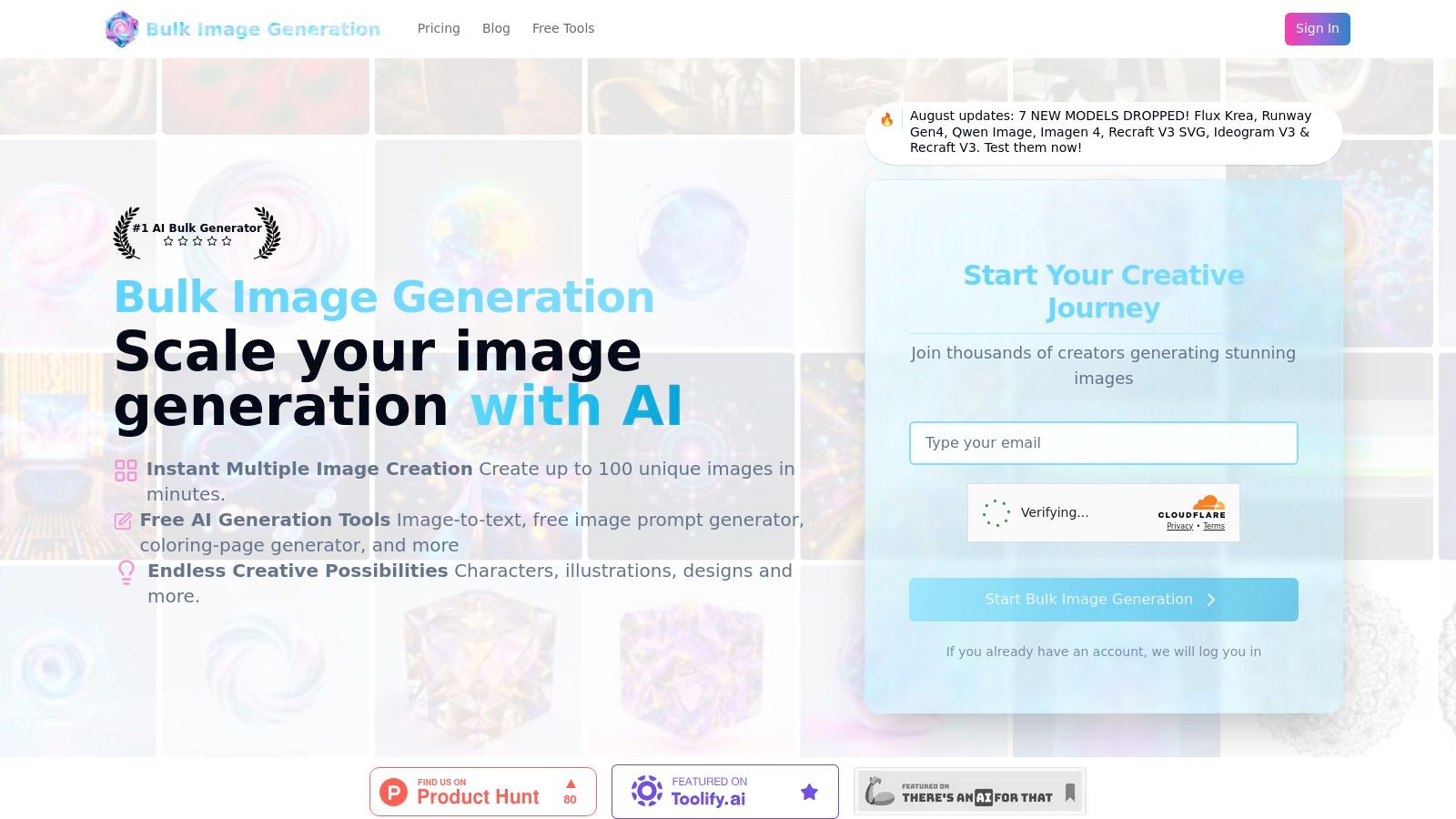
Its standout capability is generating up to 100 unique, high-quality images in under 20 seconds from a single natural language description. This eliminates the tedious task of manual prompt engineering, making it a contender for the best image generating AI for users who need to bypass a steep learning curve and achieve immediate results. The platform intelligently interprets creative goals, crafting appropriate styles and compositions automatically.
Key Features and Use Cases
Beyond its core generation engine, Bulk Image Generation offers a robust suite of integrated tools designed to accelerate post-production. The platform's batch editing features are a significant advantage, allowing users to perform tasks like background removal, face swaps, and resizing across entire image sets simultaneously. This can effectively halve the time typically spent in dedicated editing software like Photoshop.
Practical Applications Include:
- Digital Marketing: Rapidly generate a month's worth of social media visuals, ad creatives, or blog post illustrations in a single session.
- Game Development: Create vast libraries of game assets, character concepts, and environmental textures with consistent styling.
- E-commerce: Produce professional-grade product photography and lifestyle images for online stores.
- Education: Educators and creators can instantly produce custom coloring pages, flashcards, and educational materials.
Why It Stands Out
What truly distinguishes this platform is its holistic approach to the creative cycle. It complements its core offering with a rich library of free AI tools, including prompt generators and image-to-prompt converters, alongside comprehensive tutorials and a supportive community. The recent addition of 7 new AI models ensures users remain at the cutting edge of innovation.
| Feature Analysis | Strength |
|---|---|
| Generation Speed | Exceptional (Up to 100 images < 20s) |
| Ease of Use | High (Natural language input) |
| Editing Suite | Comprehensive (Batch processing) |
| Support Resources | Extensive (Free tools, tutorials) |
Pros & Cons
- Pros:
- Unmatched speed for generating large batches of professional-quality images.
- No complex prompt engineering required; uses intuitive natural language.
- Powerful built-in batch editing tools streamline post-production workflows.
- Extensive library of templates, use cases, and free supplementary AI tools.
- Cons:
- Pricing is not publicly listed, requiring direct contact or sign-up for cost details.
- The full depth of its advanced features may present a learning curve for absolute novices.
Learn more at BulkImageGeneration.com
2. Adobe Firefly
Adobe Firefly stands out by deeply embedding generative AI within the professional-grade Adobe Creative Cloud ecosystem. Rather than a standalone tool, Firefly acts as a creative co-pilot, enhancing established workflows in applications like Photoshop and Illustrator. This integration makes it one of the best image generating AI platforms for designers, marketers, and creative professionals already invested in Adobe's software suite.
The primary strength lies in its Generative Fill feature. This allows users to add, remove, or expand parts of an existing image with simple text prompts directly within Photoshop, a game-changer for photo editing and compositing. For example, a social media manager can take a product photo and instantly extend the background or add contextual elements without leaving their primary design tool.
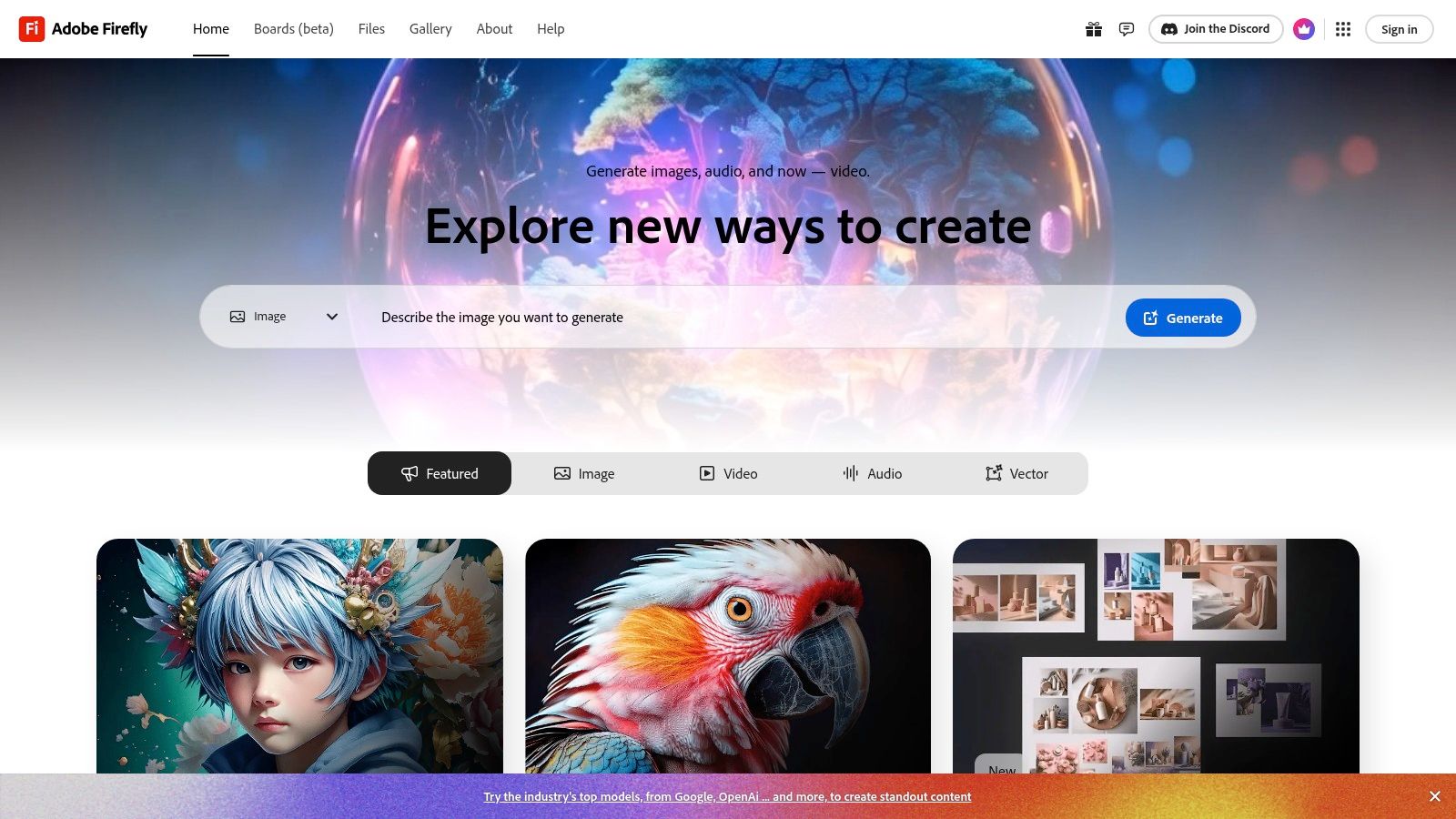
Key Features & Use Cases
Adobe has positioned Firefly as a commercially safe and ethically sound option, training its model exclusively on Adobe Stock's licensed content and public domain works. This focus on ethical sourcing provides a layer of confidence for businesses and branding agencies concerned with copyright infringement.
- Best For: Creative professionals, digital marketers, and current Adobe Creative Cloud subscribers.
- Practical Use: A small business owner can use Generative Fill in Photoshop to quickly create multiple variations of an ad banner. An educator could generate unique illustrations for lesson plans directly within Adobe Express.
- Unique Offering: The upcoming "Generative Match" feature aims to apply the style of a reference image to new creations, ensuring brand consistency across all generated assets.
Access and Pricing
Firefly is accessible through a freemium model. Free users receive a monthly allotment of 25 generative credits. To get more, users must subscribe to a premium Firefly plan (starting at $4.99/month for 100 credits) or a relevant Creative Cloud subscription, which often includes a larger pool of credits.
Pros & Cons
| Pros | Cons |
|---|---|
| Seamless integration with Photoshop & Illustrator | Subscription-based model can become costly |
| User-friendly and intuitive interface | Advanced features are tied to higher-tier plans |
| Ethically trained model ensures commercial safety | Relies on a credit system that can be limiting for heavy users |
Visit Adobe Firefly
3. Midjourney
Midjourney has earned its reputation as one of the best image generating AI platforms by consistently producing artistic, atmospheric, and uniquely stylized visuals. Operating exclusively through the chat app Discord, it fosters a vibrant, collaborative community where users generate images in public channels, creating a live feed of inspiration. This unique, community-driven approach makes it a favorite among artists, concept designers, and creators seeking a distinct aesthetic that often feels more painterly and less photorealistic than its competitors.
The platform excels at interpreting nuanced and abstract prompts, translating them into cohesive, high-quality artwork. Users control the creative process through specific commands and parameters added to their prompts, allowing for fine-tuning of aspect ratios, style intensity, and model versions. The constant evolution of its models ensures that the quality and capabilities are always improving.
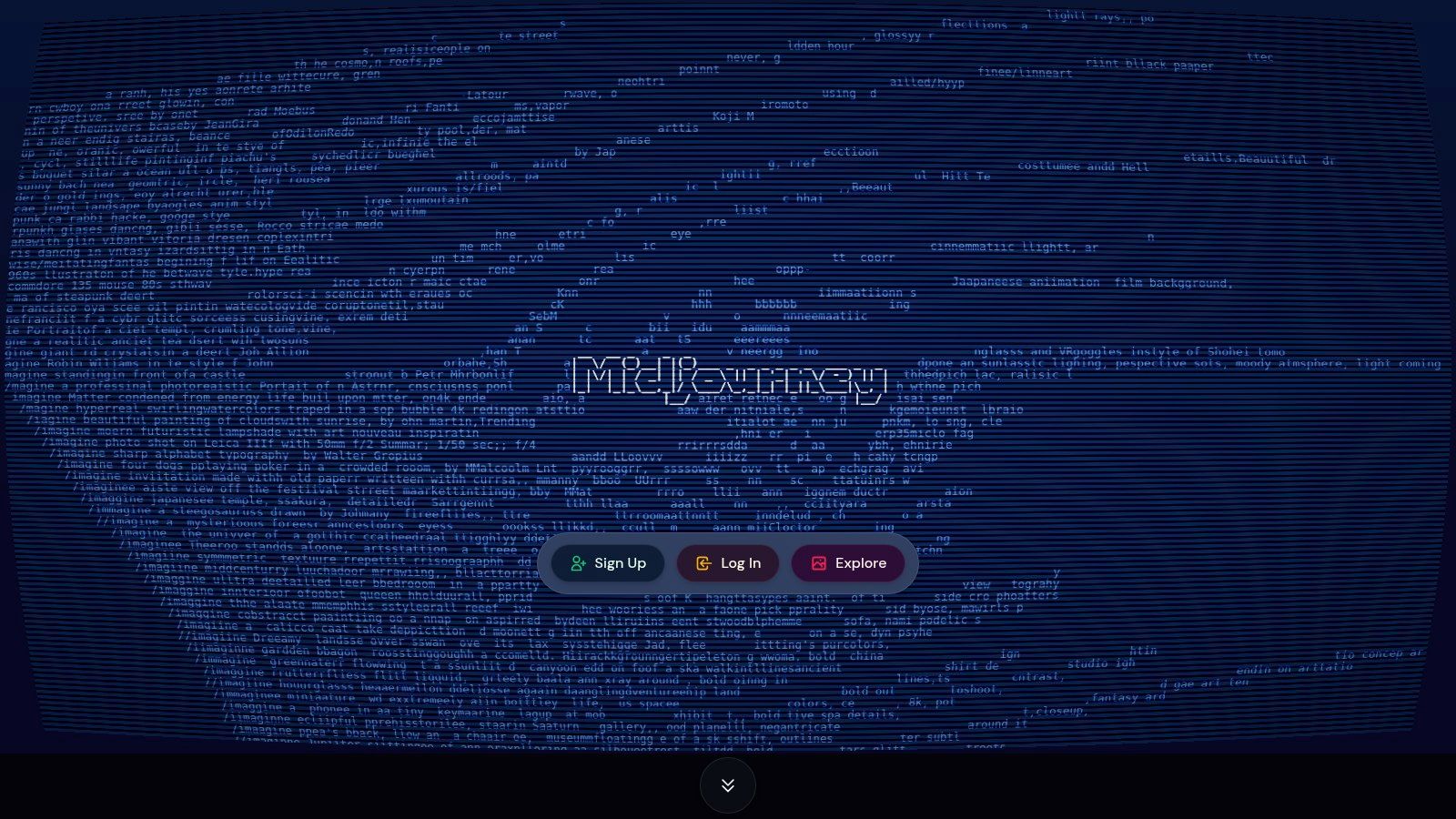
Key Features & Use Cases
Midjourney’s strength lies in its powerful command-based system and its regularly updated models, which each have their own artistic flair. This provides a deep level of control for users willing to learn the platform’s syntax, enabling the creation of highly specific and imaginative scenes that are difficult to replicate elsewhere.
- Best For: Digital artists, concept designers, and hobbyists who prioritize artistic quality and stylistic expression.
- Practical Use: An author could generate unique character portraits or fantastical book cover concepts. A game developer might use it to quickly ideate different environmental designs or creature art.
- Unique Offering: Its "remix" and "vary" features allow for incredible iteration, enabling users to subtly or dramatically alter a generated image to explore different creative directions while maintaining the core concept.
Access and Pricing
Access to Midjourney is managed entirely through Discord and requires a paid subscription, as there is no longer a free trial or tier. Plans start at the Basic Plan for around $10/month, which provides a limited number of fast-generation minutes. Higher-tier plans offer more generation time and features like "Stealth Mode" for private creations.
Pros & Cons
| Pros | Cons |
|---|---|
| Produces exceptionally artistic and high-quality images | Requires using Discord, which can be a barrier for some users |
| Powerful prompt control with advanced parameters | Subscription-based model with no free tier available |
| Highly engaged and supportive user community | The learning curve for advanced commands can be steep |
Visit Midjourney
4. DALL·E 3 by OpenAI
DALL·E 3 represents OpenAI's significant leap forward in text-to-image generation, primarily through its native integration within ChatGPT. This conversational approach transforms the creative process, allowing users to generate and refine images through a simple dialogue. Instead of wrestling with complex prompts, users can describe their vision in natural language, making it one of the best image generating AI platforms for those who prioritize ease of use and high-fidelity output.
The core advantage of DALL·E 3 is its deep understanding of nuance and detail within prompts, a direct benefit of being powered by ChatGPT. A marketer can ask for an image and then conversationally request iterative changes, such as "make the cat fluffier" or "change the background to a sunset," without starting over. This intuitive workflow is a major differentiator from other standalone image generators.
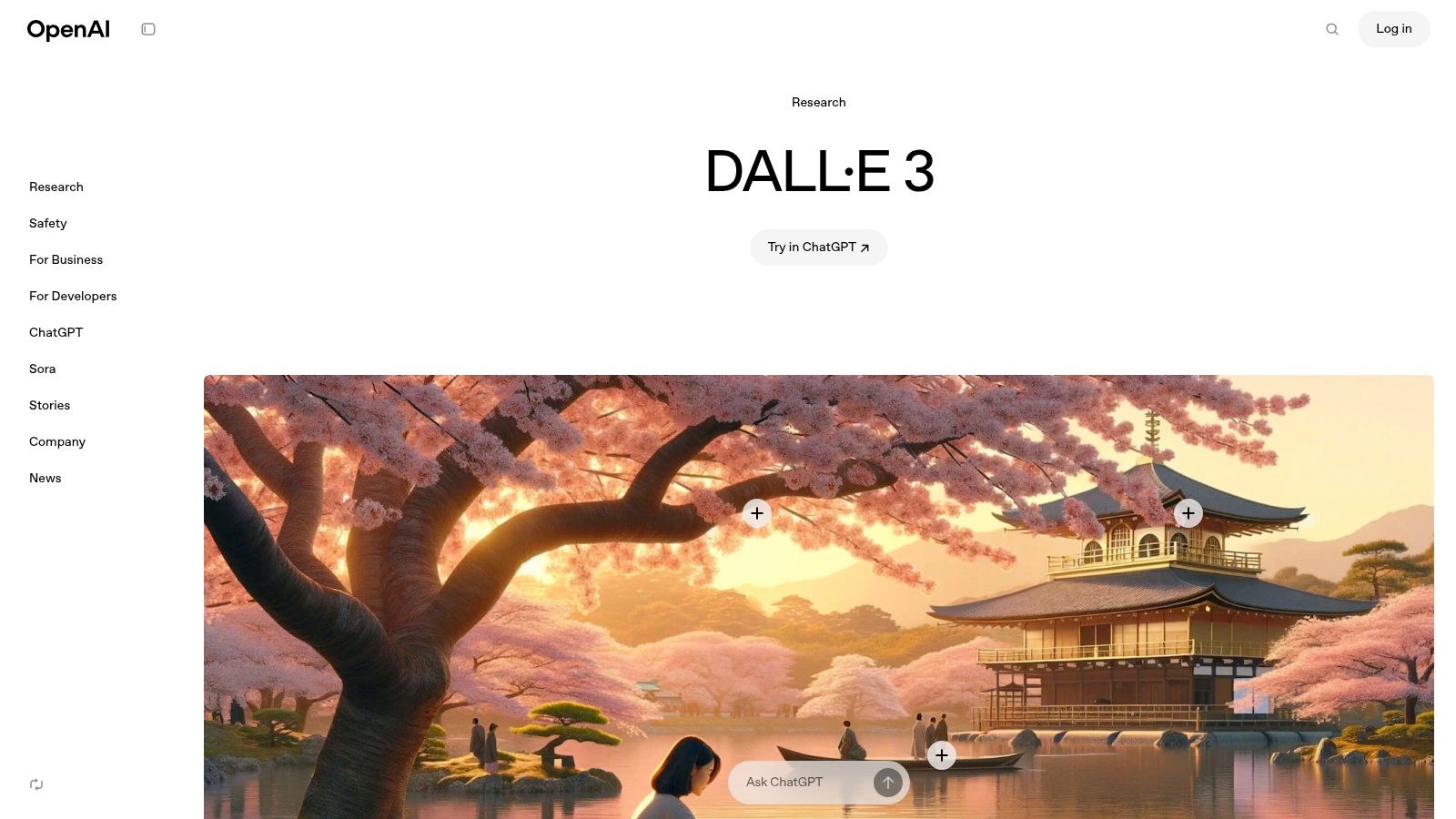
Key Features & Use Cases
DALL·E 3 excels at translating complex, descriptive sentences into coherent and detailed images, a common weak point for earlier models. It can more reliably handle text within images and follow intricate instructions involving multiple subjects and actions, which is a massive boon for specific creative projects. Mastering prompt creation can further elevate your results; you can explore tools like a free AI image prompt generator to get started.
- Best For: ChatGPT Plus users, content creators, and anyone seeking a conversational image creation experience.
- Practical Use: An educator could generate a series of historical scenes for a presentation by simply describing the events. A hobbyist can create custom coloring pages by specifying simple line art and character themes.
- Unique Offering: The conversational editing and refinement process within the ChatGPT interface is unmatched, allowing for rapid prototyping and fine-tuning of visual concepts.
Access and Pricing
Access to DALL·E 3 is exclusively bundled with OpenAI's premium subscription, ChatGPT Plus, which costs $20/month. This subscription also includes access to the latest language models like GPT-4, making it a comprehensive AI toolkit. There are no per-image credits; usage is integrated into the overall subscription plan, subject to usage caps.
Pros & Cons
| Pros | Cons |
|---|---|
| Seamless integration with ChatGPT's conversational AI | Requires a paid ChatGPT Plus subscription for access |
| Produces high-quality, detailed, and coherent images | Limited to the OpenAI ecosystem with no standalone app |
| Exceptionally user-friendly and easy to use | Usage limits may apply during periods of high demand |
Visit DALL·E 3 by OpenAI
5. Stable Diffusion by Stability AI
Stable Diffusion democratizes AI image generation by offering a powerful, open-source model that prioritizes flexibility and community-driven innovation. Unlike many closed, proprietary systems, Stable Diffusion can be run locally on a personal computer (with sufficient hardware) or accessed through various web interfaces, giving users unparalleled control. This makes it a top-tier choice for developers, researchers, and hobbyists who want to fine-tune models, experiment with custom datasets, or simply generate images without creative restrictions.
Its open-source nature means the core technology is constantly evolving through community contributions. The model excels at creating detailed, high-resolution images and supports advanced techniques like inpainting (filling in parts of an image) and outpainting (extending an image's canvas). This level of control makes it one of the best image generating AI platforms for those who need highly specific or customized visual outputs.
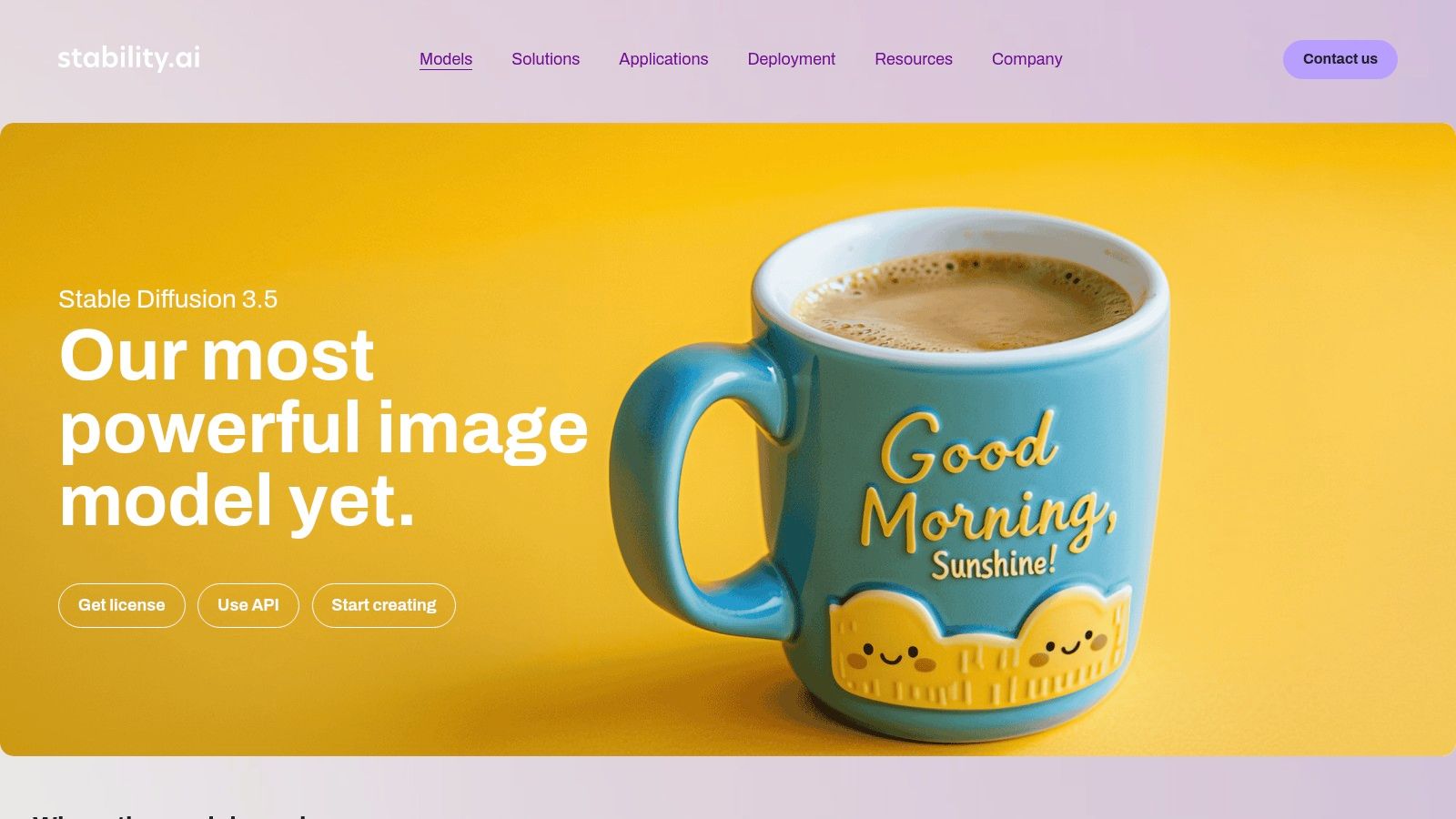
Key Features & Use Cases
The core strength of Stable Diffusion is its adaptability. While services like DreamStudio provide an easy-to-use front end, advanced users can download the model and integrate it into their own applications or workflows. This has led to a massive ecosystem of custom user interfaces and specialized models trained for specific styles, from photorealism to anime.
- Best For: Developers, technical artists, researchers, and hobbyists with a desire for deep customization.
- Practical Use: A game developer could fine-tune a model on their own game's art assets to rapidly generate concept art that matches the established style. A hobbyist can create highly specific character portraits by training the model on a handful of reference images.
- Unique Offering: Its open-source framework is its greatest asset. No other major model offers this degree of freedom, allowing for limitless experimentation and integration into third-party tools and custom software pipelines.
Access and Pricing
The Stable Diffusion model itself is free to download and use for those with the technical capability to run it locally. For a more user-friendly experience, Stability AI offers DreamStudio, its official web platform, which operates on a credit-based system. New users receive a free allotment of credits, with additional credits available for purchase (e.g., ~$10 for 1,000 credits).
Pros & Cons
| Pros | Cons |
|---|---|
| Highly customizable and open-source | Requires technical knowledge for local setup |
| Free to use locally with no restrictions | Image quality can be inconsistent without precise prompting |
| Active and innovative developer community | Official web interface (DreamStudio) is credit-based |
Visit Stable Diffusion by Stability AI
6. DreamStudio by Stability AI
DreamStudio serves as the official web interface for Stability AI's powerful Stable Diffusion models. It provides a clean, accessible entry point for users to harness sophisticated image generation technology without needing to run complex software locally. This balance of power and simplicity makes it one of the best image generating AI platforms for artists, developers, and hobbyists who want direct access to a foundational model.
The platform’s strength is its directness and customizability. Users can fine-tune a wide array of parameters, including image dimensions, negative prompts, and the specific version of the Stable Diffusion model being used. For example, a concept artist can experiment with different settings to achieve a precise illustrative style, while a developer can prototype API calls before integrating the technology into their own application.
Key Features & Use Cases
DreamStudio operates on a straightforward text-to-image basis but offers deep control for those who want it. This includes the ability to use an initial image as a structural guide (image-to-image) and edit specific parts of a generation using masks. This advanced control is a significant draw for users who have moved beyond basic prompting.
- Best For: Artists, developers, and enthusiasts seeking advanced control over the Stable Diffusion model.
- Practical Use: A game developer could generate a wide variety of character portraits or environmental textures by tweaking style and seed parameters. An educator might create a series of historical illustrations by uploading a reference sketch and guiding the AI with a detailed prompt.
- Unique Offering: Direct access to the latest and experimental versions of Stable Diffusion models as soon as they are released by Stability AI.
Access and Pricing
DreamStudio uses a credit-based system. New users receive a free allotment of 25 credits to begin experimenting. Afterward, users can purchase additional credits, with pricing set at $10 for 1,000 credits. The cost of each generation depends on the resolution and number of steps, providing a flexible pay-as-you-go model that is cost-effective for intermittent use.
Pros & Cons
| Pros | Cons |
|---|---|
| Flexible and affordable credit-based pricing | Credit system can be confusing for new users |
| High-quality, high-resolution image outputs | Interface is more technical than some competitors |
| Advanced control over generation parameters | Less focus on in-painting or team collaboration features |
Visit DreamStudio by Stability AI
7. Jasper Art
Jasper Art positions itself as a high-volume, streamlined tool for content creators and marketers. Instead of complex features and credit-based systems, it offers unlimited generations for a flat monthly fee, making it one of the best image generating AI platforms for users who need a steady stream of visuals without worrying about usage limits. Its straightforward interface is designed for speed and efficiency, appealing to those who prioritize rapid content creation over granular artistic control.
The platform's main value proposition is its simplicity and generous usage policy. A blogger can generate dozens of featured images for their articles, or a social media manager can create a month's worth of visual content in a single session, all without tracking credits. This makes it an incredibly practical tool for marketing teams and solo entrepreneurs who need consistent, commercially viable images on a budget.
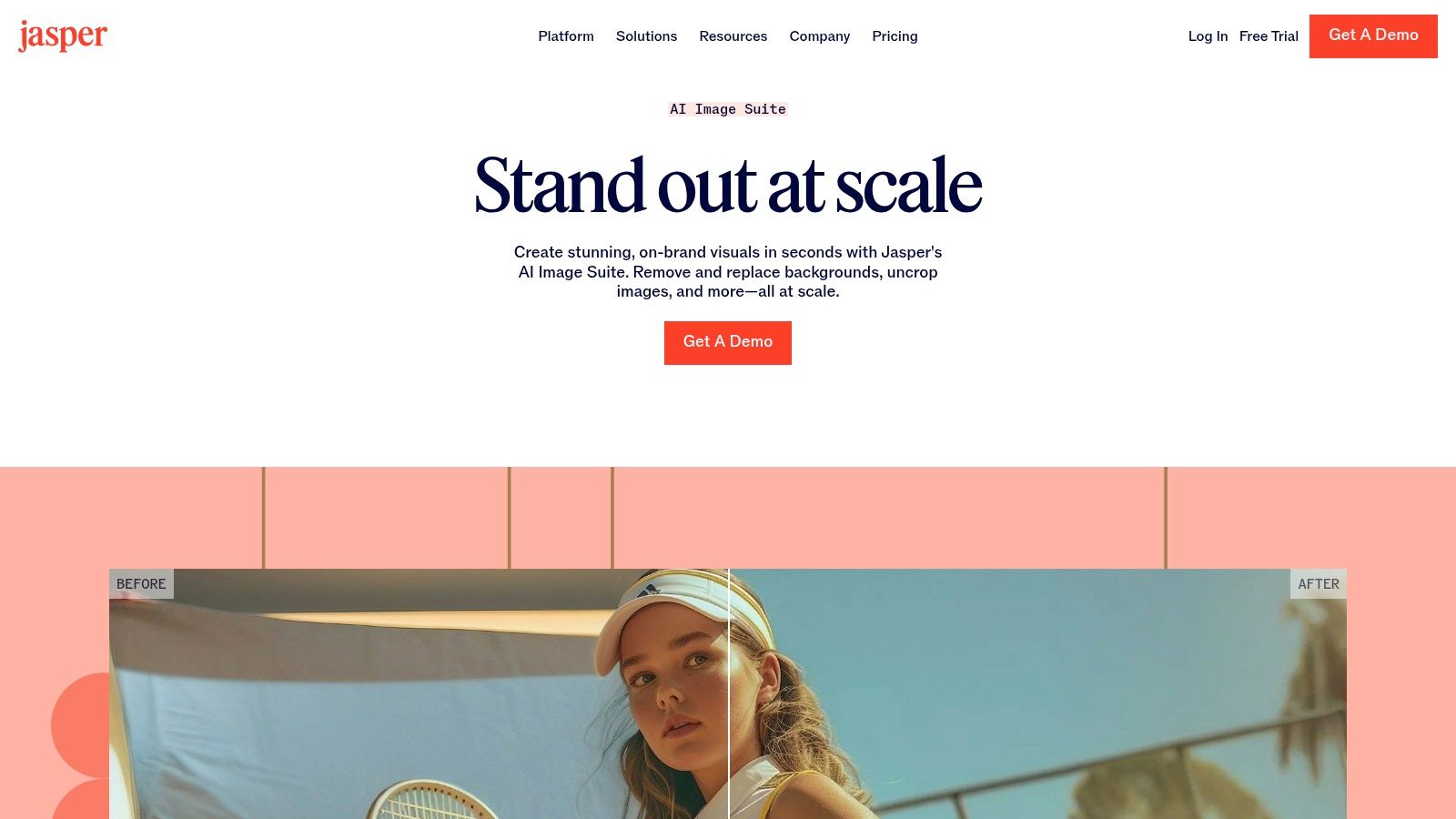
Key Features & Use Cases
Jasper Art emphasizes utility and global accessibility by supporting over 30 languages, broadening its user base significantly. All images created are royalty-free, providing peace of mind for commercial applications like blog posts, social media ads, and website banners. The platform is built to deliver results quickly, generating four image variations from a single prompt in seconds.
- Best For: Content creators, bloggers, and marketing teams needing high-volume image output.
- Practical Use: A marketer could use Jasper Art to quickly A/B test different ad creatives by generating multiple visual concepts for the same copy. An author could create unlimited character concepts or cover art ideas without extra costs.
- Unique Offering: The combination of unlimited generation with a fixed price is rare in the market, making it a predictable and budget-friendly choice for consistent users.
Access and Pricing
Jasper Art is available as an add-on to a Jasper AI subscription (for copywriting) or as a standalone plan. The standalone Art plan typically starts around $20 per user per month, offering unlimited, watermark-free image generations. This pricing model is highly competitive for users with high-volume needs.
Pros & Cons
| Pros | Cons |
|---|---|
| Unlimited image generation at a fixed monthly price | Fewer advanced editing or inpainting features |
| Simple, user-friendly interface for fast creation | Lacks the fine-tuned creative control of competitors |
| Multilingual support for over 30 languages | Quality can sometimes be less consistent than premium tools |
Visit Jasper Art
8. Freepik
Freepik positions itself as a comprehensive creative hub by integrating a user-friendly AI image generator directly into its massive library of stock photos, vectors, and templates. This unique blend makes it one of the best image generating AI platforms for users who need a one-stop-shop for both AI-generated and traditional stock assets. It bridges the gap between pure AI creation and practical design application, offering tools for a complete workflow.
The platform excels by allowing users to generate an image and then immediately find complementary design elements within the same interface. A marketer, for instance, could create a custom AI graphic for a campaign and then seamlessly pull in a pre-made social media template to place it into, streamlining the entire content creation process without juggling multiple services.
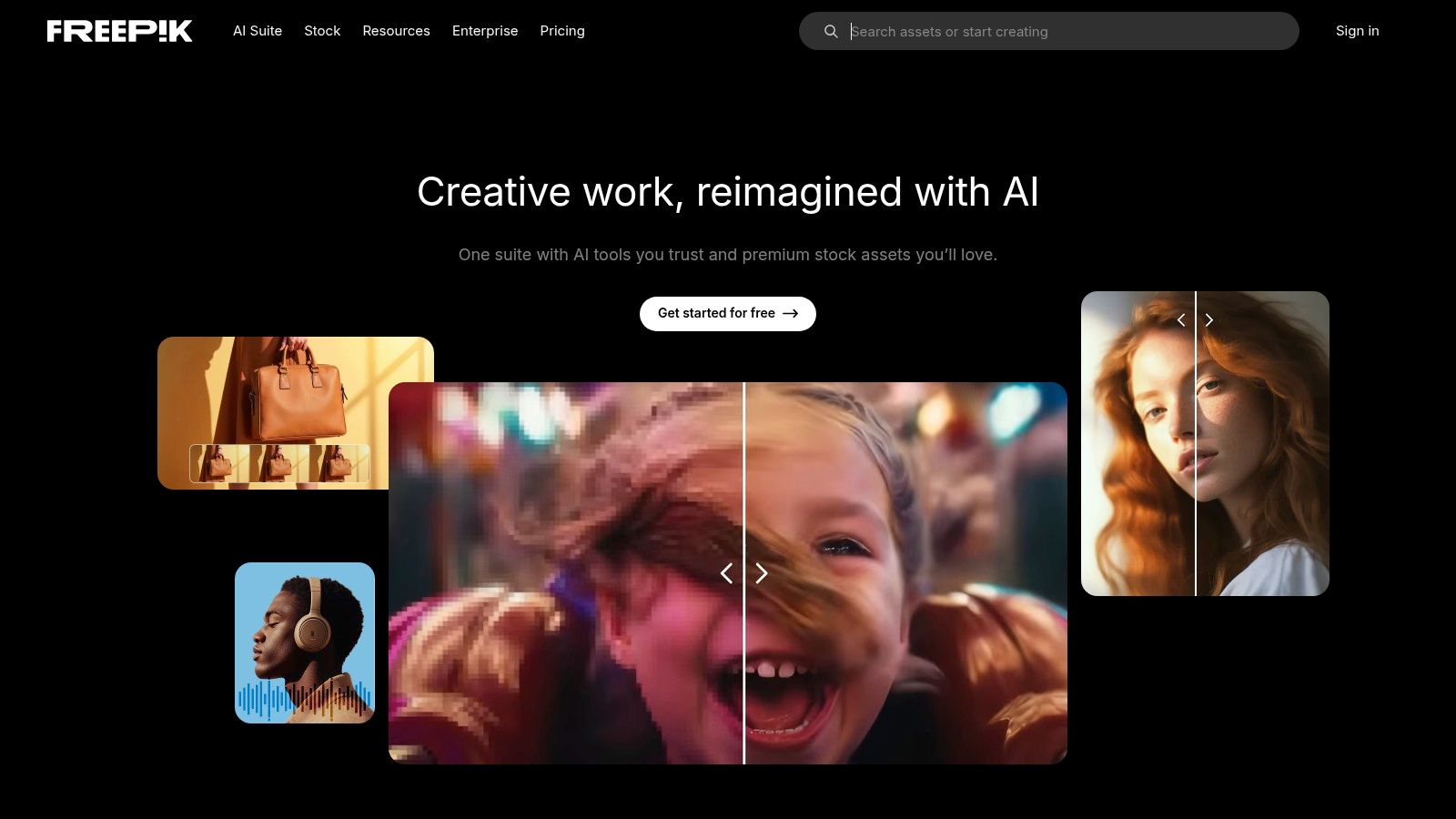
Key Features & Use Cases
Freepik's AI generator is designed for accessibility, providing a simple text-to-image interface that is easy for beginners to master. The real power comes from its connection to Freepik’s existing ecosystem, which includes an extensive collection of high-quality assets. You can find more information about its capabilities in our detailed look at AI stock image generators.
- Best For: Social media managers, bloggers, and small businesses needing a mix of AI and stock content.
- Practical Use: A blogger can generate a unique hero image for an article and then download matching vector icons for infographics all within a single subscription. An Etsy seller could create AI-generated patterns for products and use Freepik's mockups to display them.
- Unique Offering: The platform's main advantage is its unified library, where AI-generated images live alongside millions of human-made photos, vectors, and PSD files, offering unparalleled creative flexibility.
Access and Pricing
Freepik operates on a freemium model. Free users have access to a limited selection of assets and a small number of daily AI image generations. The Premium plan (starting around $12/month when billed annually) unlocks the entire library of assets, provides more daily AI generations, and removes attribution requirements.
Pros & Cons
| Pros | Cons |
|---|---|
| All-in-one platform with AI and stock assets | Free version is quite limited in generations and access |
| Very user-friendly and great for beginners | Premium content requires an ongoing subscription |
| Affordable pricing for a vast library of resources | AI model may be less advanced than dedicated generators |
Visit Freepik
9. Recraft
Recraft positions itself as a specialized AI tool built for designers, marketers, and brand managers who require more than just a random image. It distinguishes itself by focusing on vector art, icons, 3D illustrations, and maintaining stylistic consistency across multiple assets. This makes it one of the best image generating AI platforms for creating cohesive brand materials, from logos and icons to full-blown illustrations.
The platform's core strength lies in its Brand Kit functionality. Users can upload a color palette and define a specific artistic style, which Recraft will then apply to all subsequent generations. This ensures that every icon, illustration, or graphic produced aligns perfectly with established brand guidelines, solving a major pain point for professional designers.
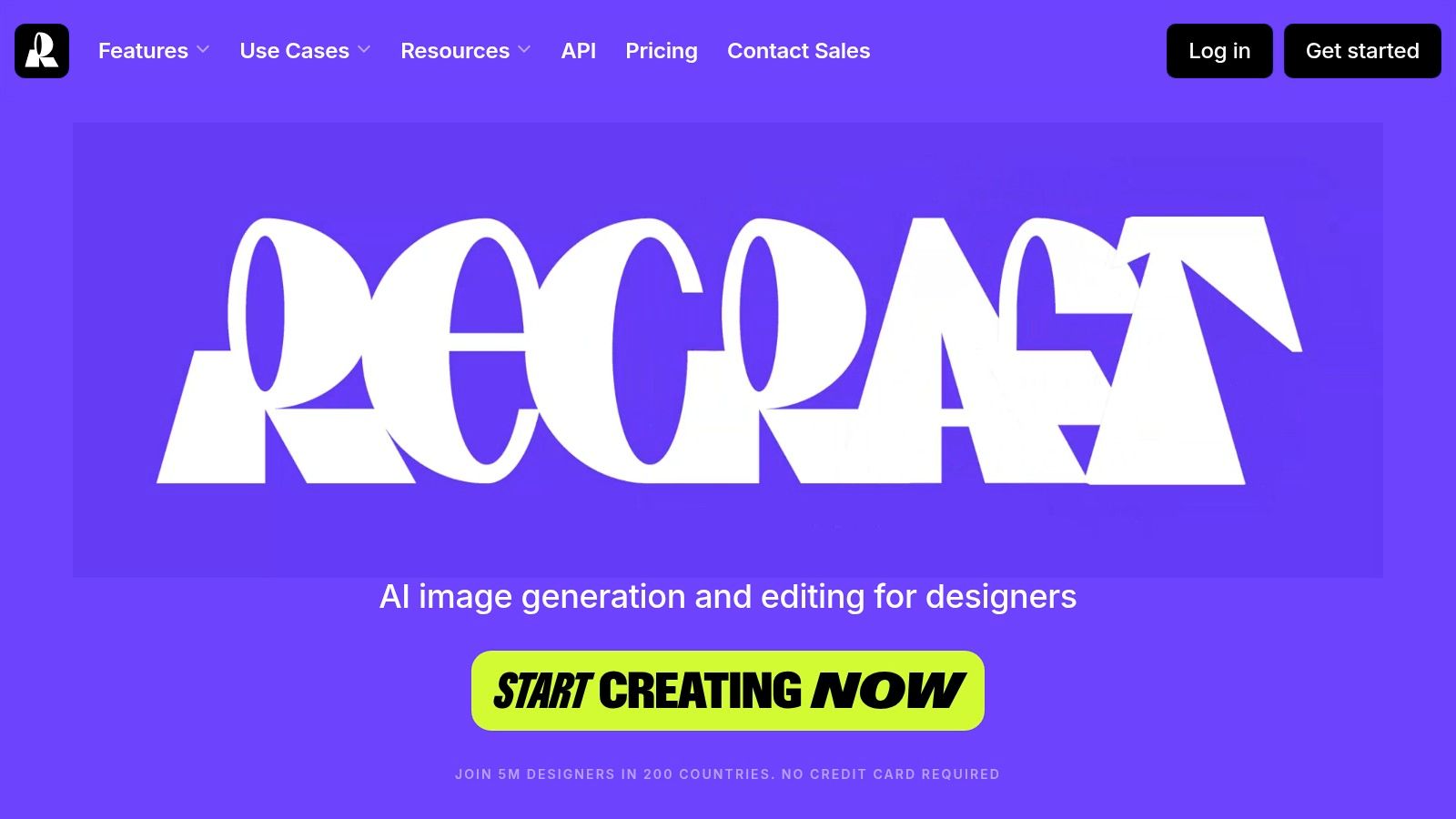
Key Features & Use Cases
Recraft excels at producing editable, high-resolution vector outputs (SVG), which is a significant advantage over typical pixel-based generators. This allows designers to take the generated assets and further refine them in professional software like Adobe Illustrator or Figma without any loss of quality. The emphasis on layout control gives users fine-tuned command over the final composition.
- Best For: Graphic designers, branding agencies, and marketing teams needing consistent visual assets.
- Practical Use: A marketing team can create a complete set of custom icons for a new app feature, all perfectly matching the company's color palette and design language. A solo entrepreneur can generate a professional logo and accompanying social media graphics in a unified style.
- Unique Offering: The ability to generate and export true SVG vector files is a standout feature, providing maximum flexibility for professional design workflows.
Access and Pricing
Recraft operates on a freemium model. A generous free plan is available for personal use, which includes unlimited generations but with the requirement that all images are public. For commercial use and private storage, users must upgrade to a paid plan, starting at $20 per month, which unlocks advanced features and professional licensing.
Pros & Cons
| Pros | Cons |
|---|---|
| Focus on brand consistency with style palettes | Free plan images are public by default |
| Generates high-quality, editable SVG vector files | Learning curve for mastering advanced layout tools |
| Excellent for creating icons and illustrations | Subscription is necessary for any commercial work |
Visit Recraft
10. Luminar Neo by Skylum
Luminar Neo by Skylum carves its niche by integrating AI-powered generation and enhancement directly into a comprehensive photo editing suite. Unlike purely web-based generators, Luminar Neo is a robust software for Windows and macOS that acts as a powerful post-processing tool for photographers. This makes it one of the best image generating AI options for professionals and hobbyists who want to blend generative capabilities with traditional, high-fidelity photo editing.
Its AI tools go beyond simple creation; they are designed to enhance and manipulate existing photographs with incredible precision. For instance, its GenErase feature allows users to remove unwanted objects or distractions from a photo, with AI intelligently generating a seamless background to fill the space. This is invaluable for portrait and landscape photographers aiming for a perfect final shot.
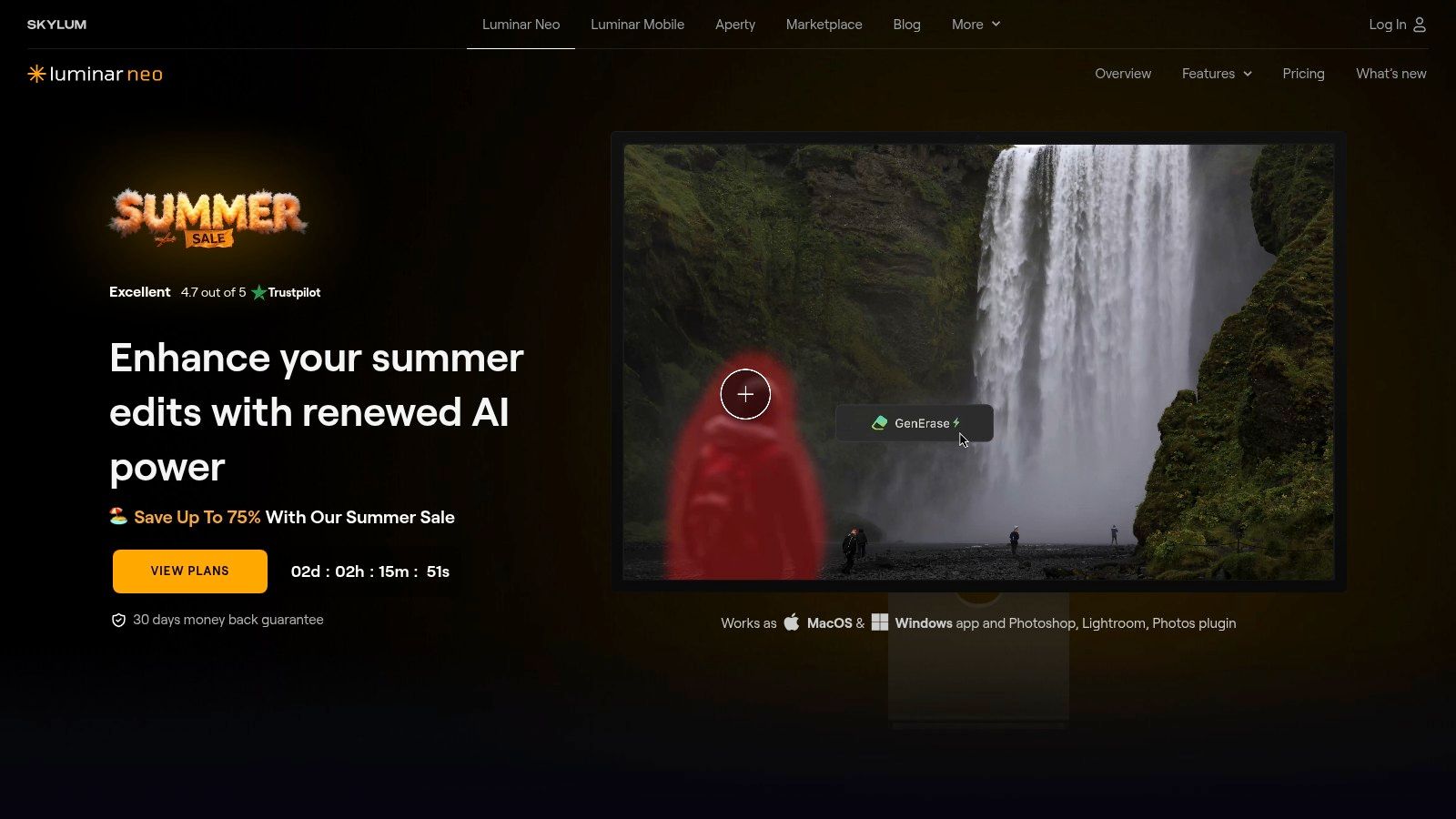
Key Features & Use Cases
Luminar Neo’s strength is its dual identity as both a powerful RAW photo editor and an AI toolkit. This allows a fluid workflow where a photographer can process a RAW file, make precise color and light adjustments, and then use AI features like Sky AI or Studio Light to fundamentally transform the image’s mood and composition without leaving the application.
- Best For: Professional and amateur photographers, creative artists, and anyone needing advanced photo editing alongside AI enhancements.
- Practical Use: A real estate photographer can use the Sky AI feature to instantly replace a dull, overcast sky with a vibrant sunset. A portrait artist can use Studio Light AI to realistically add or adjust lighting after the shoot has concluded.
- Unique Offering: Its ability to function as both a standalone application and a plugin for Adobe Photoshop and Lightroom provides exceptional workflow flexibility.
Access and Pricing
Skylum offers flexible purchasing models. Users can opt for a lifetime license with a one-time purchase or choose a subscription model (Pro, starting around $9.92/month billed annually) that includes ongoing updates and access to all extensions. A free trial is typically available for users to test its capabilities.
Pros & Cons
| Pros | Cons |
|---|---|
| Comprehensive editing and AI features in one tool | Requires powerful hardware for smooth performance |
| Flexible one-time purchase or subscription options | Some advanced AI features may have a learning curve |
| Excellent RAW file processing capabilities | Primarily an editor with AI, not a pure text-to-image generator |
Visit Luminar Neo by Skylum
11. NightCafe Studio
NightCafe Studio positions itself as a community-centric AI art generator, making it an excellent starting point for beginners and hobbyists. It stands out by offering access to multiple generation algorithms, including Stable Diffusion and their own proprietary models, allowing users to experiment with diverse artistic styles from a single platform. This makes it a versatile tool for those exploring the creative possibilities of AI without committing to a single ecosystem.
The platform emphasizes user interaction, featuring daily challenges and a public gallery where creators can share, comment on, and "evolve" each other's work. This social layer provides inspiration and a sense of community, differentiating it from more utility-focused generators and making it one of the best image generating AI tools for collaborative and social creation.
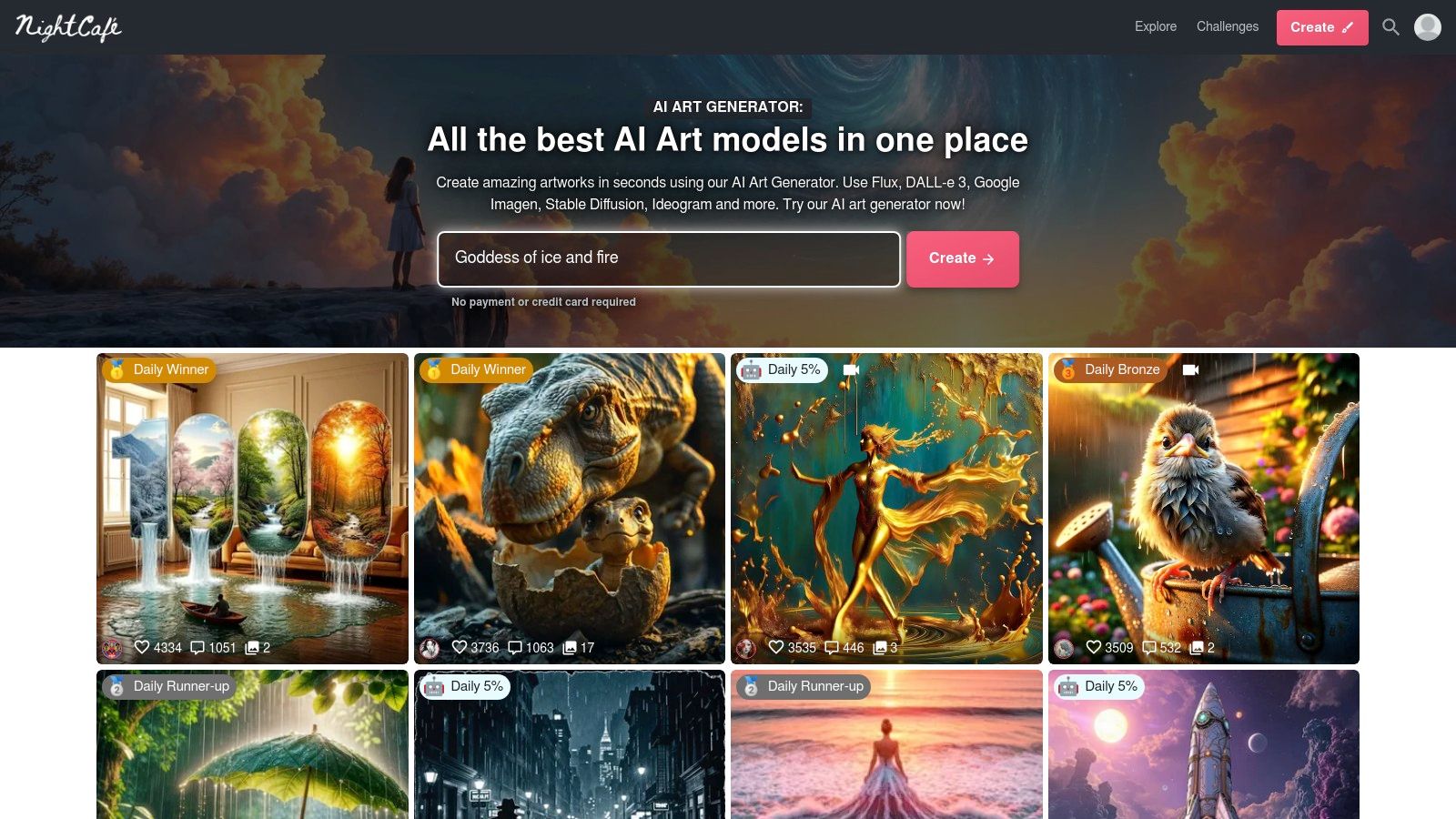
Key Features & Use Cases
NightCafe's strength lies in its accessibility and the variety it offers. Users are not locked into one specific model, giving them the freedom to find the algorithm that best suits their prompt and desired outcome. The interface is straightforward, guiding new users through the creation process with clear options and presets.
- Best For: Hobbyists, AI art beginners, and users who value community engagement.
- Practical Use: An educator could use NightCafe to generate unique coloring pages for a class project. A hobbyist can experiment with creating fantasy characters or abstract art and share it with a like-minded community for feedback. You can also learn how to create digital product images for other applications.
- Unique Offering: The ability to "evolve" an existing image, which means using another user's public creation as a starting point for your own, fostering a unique, collaborative art-making process.
Access and Pricing
NightCafe operates on a freemium credit system. New users receive a set of free credits to start, with additional free credits awarded daily for logging in and participating in community activities. For more extensive use, users can purchase credit packs or subscribe to a monthly plan (starting at $4.79/month for 100 credits) which provides a better per-credit value.
Pros & Cons
| Pros | Cons |
|---|---|
| Access to multiple AI generation models | Free tier is heavily limited by a daily credit system |
| Strong, active user community for inspiration | Interface can feel less polished than professional-grade tools |
| Generous free credit system for casual use | Subscription is necessary for any consistent or heavy usage |
Visit NightCafe Studio
12. Artbreeder
Artbreeder takes a unique, gene-splicing approach to AI art, positioning itself as a creative playground for remixing and evolving images. Instead of generating from a text prompt alone, it allows users to "breed" new images by blending existing ones, adjusting their "genes" like age, gender, or artistic style. This makes it one of the best image generating AI tools for artists and creators who enjoy exploration and happy accidents over precise prompt-based control.
The platform excels at creating variations and exploring concepts through its core features: Splicer and Mixer. A user can upload their own image and blend it with community-sourced art, or start with existing Artbreeder creations and tweak their attributes with sliders. This experimental process is perfect for developing character concepts, abstract art, or surreal landscapes that would be difficult to describe in a simple prompt.
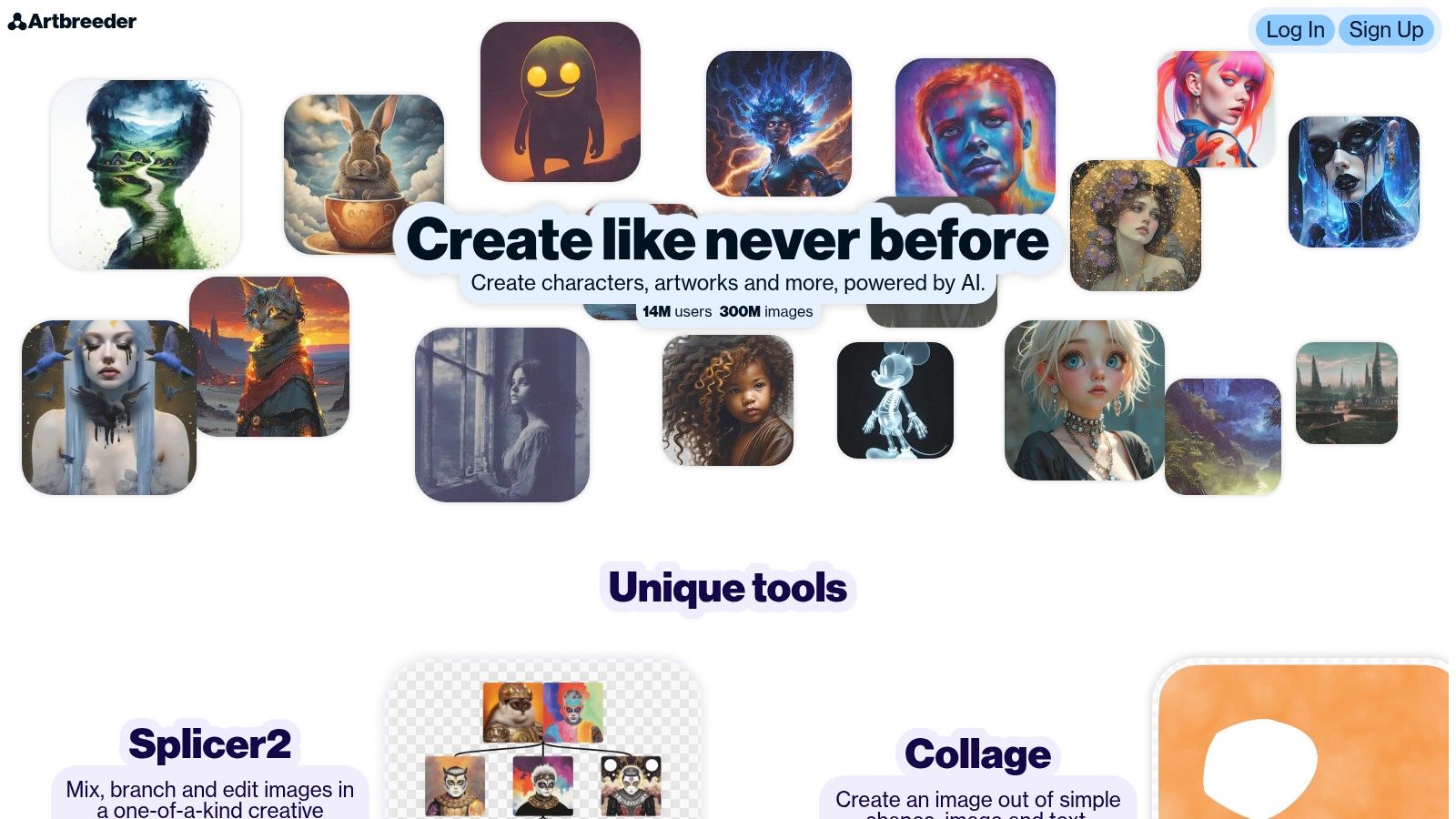
Key Features & Use Cases
Artbreeder thrives on its vibrant community, where users share their creations and "genes," allowing others to build upon their work. This collaborative and iterative nature is its defining characteristic, fostering a different kind of creativity compared to more solitary, prompt-focused tools. The platform is highly intuitive, encouraging play and discovery.
- Best For: Concept artists, hobbyists, and anyone interested in experimental or collaborative AI art.
- Practical Use: A game developer could use Artbreeder to rapidly iterate on character portraits by blending different faces and styles. An educator could demonstrate genetic principles by "breeding" images of animals or plants.
- Unique Offering: The genetic algorithm that powers the platform allows for a fine-tuned, slider-based control over image attributes, offering a tactile and interactive creation experience.
Access and Pricing
Artbreeder operates on a freemium model. The free tier offers a limited number of monthly credits for creating images and high-resolution downloads. For more intensive use, paid plans start at $8.99/month, providing more credits, additional features like private mode, and faster generation queues.
Pros & Cons
| Pros | Cons |
|---|---|
| Unique, experimental image creation approach | Less precise control than prompt-based generators |
| Highly collaborative and community-driven | Subscription is required for full capabilities |
| Generous free tier for casual exploration | Free tier features are limited for serious projects |
Visit Artbreeder
Top 12 AI Image Generators Feature Comparison
| Platform | Core Features | User Experience & Quality | Value Proposition | Target Audience | Price Point / Model |
|---|---|---|---|---|---|
| Bulk Image Generation | AI-powered bulk image generation (up to 100 images in <20s), batch editing (background removal, face swaps, resizing, enhancement), free AI tools (prompt generators, aspect ratio calculators) | Fast, intuitive natural language input, reduces editing time by half, rich tutorials and community support | High-volume, professional-quality images fast without manual prompt engineering | Digital marketers, educators, small business owners, branding agencies, creatives | Pricing not publicly disclosed upfront |
| Adobe Firefly | Text-to-image/video, Generative Fill, Adobe CC integration, collaboration tools | User-friendly, seamless Adobe ecosystem integration, regular updates | Integrated AI creativity inside Adobe suite | Creative professionals relying on Adobe CC | Subscription-based |
| Midjourney | Text-to-image, multiple artistic styles, high-res outputs, active community | High-quality photorealistic & stylized images via Discord, creative control | Photorealistic AI art with strong community | Artists, designers, creative tech users | Subscription only, no free tier |
| DALL·E 3 by OpenAI | ChatGPT integration, high-quality image generation, image editing | Easy to use with smooth ChatGPT UI, regularly updated | High-quality AI images integrated in ChatGPT | Casual users, professionals using OpenAI's platform | Requires ChatGPT Plus subscription |
| Stable Diffusion | Open-source, inpainting/outpainting, high-res outputs, community-driven | Flexible and customizable, technical knowledge required | Free with optional paid credits, highly customizable | Developers, AI enthusiasts, advanced users | Free with paid credit options |
| DreamStudio | Stable Diffusion tech, customizable settings, credit-based system | User-friendly web platform | Flexible pay-as-you-go pricing | Casual users preferring online tools | Credit-based payment system |
| Jasper Art | Unlimited image generation, royalty-free use, supports 30+ languages | Simple, fast image creation for content | Fixed monthly pricing for high-volume use | Content creators, marketers | Fixed monthly fee |
| Freepik | AI image generation plus large stock library, customizable templates | Easy to use, combines AI and stock assets | Affordable access to AI and creative resources | Designers needing stock + AI generation | Free and premium subscription |
| Recraft | Text-to-image, brand consistency focus, layout control | User-friendly, precise branding tools | Professional design workflows and brand management | Branding agencies, professional designers | Subscription-based |
| Luminar Neo by Skylum | AI editing and generation, RAW support, standalone/plugin | Comprehensive editing tools, multiple purchase options | Versatile photo editing with AI boost | Photographers, creative professionals | One-time purchase or subscription |
| NightCafe Studio | Multiple AI algorithms, community sharing, free tier | Easy for beginners, free credits with subscriptions | Affordable access with community features | Casual users, hobbyists | Free tier + subscription available |
| Artbreeder | Genetic algorithms for image blending, high-res output | Experimental, community-driven creative platform | Unique AI art blending | Experimenters, community-focused artists | Free tier + subscription available |
The Future of Creativity is Collaborative, Not Automated
We've journeyed through the dynamic and rapidly evolving landscape of AI image generation, exploring a diverse array of powerful tools. From the unparalleled artistic control of Midjourney to the seamless ecosystem integration of Adobe Firefly and the open-source flexibility of Stable Diffusion, the central theme is clear. The era of generative AI isn't about replacing human ingenuity; it's about amplifying it.
The best image generating AI for you is not a one-size-fits-all answer. It's a deeply personal choice that hinges on your specific goals, technical comfort level, and creative workflow. The sheer variety of platforms, from the intuitive interface of Freepik to the genetic artistry of Artbreeder, demonstrates that this technology is becoming more accessible and specialized.
Key Takeaways and Selecting Your Creative Co-Pilot
Making the right choice requires a clear understanding of your needs. Before you commit to a platform, consider these pivotal questions:
- What is your primary use case? Are you a digital marketer needing consistent, on-brand assets? Tools like Bulk Image Generation or Jasper Art are built for scale and efficiency. Are you an artist exploring new visual styles? Midjourney or NightCafe Studio might be your ideal playground.
- How important is photorealism vs. artistic style? DALL·E 3 excels at interpreting natural language for realistic outputs, while Midjourney is renowned for its stylized, atmospheric creations. Recraft offers a unique focus on vector art and illustrations, perfect for designers.
- What is your budget? Your financial commitment can range from free, open-source models like Stable Diffusion to subscription-based services with varying tiers. Evaluate the pricing models of DreamStudio, Adobe Firefly, and others against the value they provide for your specific projects.
- Do you need to edit your images? For those who require post-generation refinement, a tool like Luminar Neo, which combines AI generation with a full photo editing suite, offers an all-in-one solution that streamlines the creative process from concept to final polish.
Integrating AI Into Your Workflow: Practical Considerations
Adopting these tools effectively goes beyond just writing prompts. For small business owners and branding agencies, integrating AI means establishing clear guidelines for style, tone, and brand consistency. For educators, it involves teaching students not just how to use the tools, but how to think critically about the outputs and the ethics of AI-generated content.
This integration is part of a much larger trend. As AI continues to reshape industries, understanding the full scope of AI automation services becomes crucial for businesses aiming for greater efficiency and innovation in marketing, design, and beyond. This technology isn't just about creating a single image; it's about optimizing entire creative and operational pipelines.
Ultimately, the true power of the best image generating AI is unlocked when it's treated as a collaborator. It's a tireless brainstorming partner, an infinitely patient assistant that can render dozens of variations in minutes, and a technical specialist that can execute complex visual ideas. It frees you from the mechanical aspects of creation, allowing you to focus on the bigger picture: the story, the emotion, and the message you want to convey.
The journey into AI-powered creativity is just beginning. The models will become more sophisticated, the interfaces more intuitive, and the possibilities even more profound. We encourage you to embrace this new frontier with curiosity and an open mind. Experiment with the free trials offered by many of these platforms, join their communities, and start building the future of visual communication, one prompt at a time.
Ready to move from single-image creation to large-scale production? For businesses and creators who need to generate hundreds or thousands of unique, on-brand images efficiently, Bulk Image Generation provides the specialized workflow you need. Explore how you can automate your visual content strategy and scale your creativity at Bulk Image Generation.